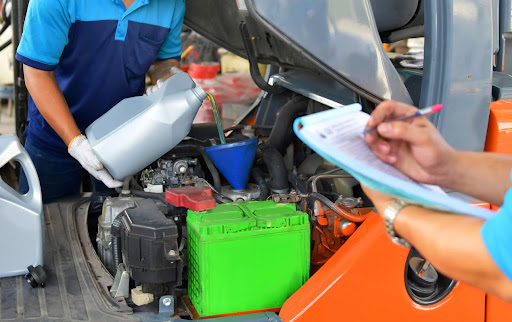Forklifts are a vital part of many industries. They help move heavy loads, streamline operations, and increase productivity.
However, like any machinery, they require regular maintenance. This is where a forklifts service would come into play.
Proper maintenance ensures the longevity of your forklift. It keeps the machine running smoothly, reducing the risk of breakdowns and costly repairs.
But it’s not just about saving money. A well-maintained forklift is also safer to operate, reducing the risk of workplace accidents.
This article will provide essential tips for maintaining your forklift. From daily inspections to regular fluid checks, we’ll cover everything you need to know.
So, whether you’re a forklift operator, a warehouse manager, or a business owner, read on. These tips will help you keep your forklift in top shape for years to come.
Understanding the Importance of Forklift Maintenance
Regular maintenance is crucial for the longevity of forklifts. Without it, even minor issues can escalate into major problems. This can lead to costly repairs and unexpected downtime.
A well-maintained forklift ensures the safety of operators and those around them. It reduces the risk of accidents caused by malfunctioning parts. Safe operation is a priority in any workplace.
Preventive maintenance helps identify potential problems early. This proactive approach saves time and money in the long run. It also extends the life of your equipment.
Proper maintenance maximises the efficiency of forklifts. It helps the machine perform at its best, increasing productivity. When forklifts run smoothly, operations run smoothly too.
Daily Inspection Checklist
A daily inspection of forklifts is imperative. It helps catch small issues before they become serious problems. This habit also ensures safety for everyone involved.
Focus on essential components during inspections. This includes the forks, mast, and tyres. Every part plays a critical role in the forklift’s operation.
Create a checklist to maintain consistency. It guides you through every necessary step. Here’s a sample checklist for daily inspections:
- Check oil, coolant, and hydraulic fluid levels
- Inspect tyres for wear and proper inflation
- Test the battery and electrical systems
- Verify functionality of lights, horns, and seatbelts
- Assess the condition of forks, mast, and lift components
Proper attention should also be given to the forklift’s controls. Ensure gauges are functioning correctly. Malfunctioning gauges can cause significant errors in operation.
Finally, report any issues immediately. Immediate action helps prevent further complications. Operators should be trained to perform these inspections diligently.
Regular Fluid Checks and Replacements
Maintaining optimal fluid levels in a forklift is essential. Oil, coolant, and hydraulic fluids are crucial for smooth operation. Without regular checks, these fluids can lead to serious mechanical failures.
Inspect fluid levels as part of routine maintenance. This simple task can prevent costly repairs. Frequent checks help identify potential leaks early on.
Schedule regular fluid replacements to keep the forklift in prime condition. Over time, fluids can degrade and lose effectiveness. New fluids ensure proper lubrication and cooling.
Operators should understand the importance of fluid maintenance. Proper training includes knowing how to check and replace these fluids. This knowledge helps in extending the lifespan of the forklift.
Tyre Maintenance and Inspection
Forklift tyres play a critical role in safety and performance. Regular inspection of tyres for wear and proper inflation is necessary. Worn tyres can lead to accidents and reduced efficiency.
Check for visible signs of damage, such as cuts or punctures. These issues can compromise the forklift’s stability. Immediate replacement of damaged tyres is crucial to avoid further problems.
Proper tyre inflation is essential for maneuverability and load handling. Under-inflated tyres can affect fuel efficiency and increase wear. Regular checks ensure optimal tyre pressure is maintained.
Battery and Charging System Care for Electric Forklifts
Electric forklifts require careful battery maintenance to stay effective. Regularly check the battery’s water level and refill if necessary. Proper water levels ensure efficient energy storage and extend battery life.
Charging habits also affect battery performance. Always allow the battery to cool down before recharging. Avoid frequent short charges; instead, charge fully to prolong its lifespan.
The charging system should undergo routine inspections. Ensure connections are secure and clean to prevent power loss. Regular maintenance can prevent unexpected breakdowns and maintain operational efficiency.
Cleaning and Debris Management
Keeping forklifts clean is vital for their performance. Dust and debris can cause mechanical problems if not regularly addressed. A clean forklift operates more efficiently and safely.
Regularly washing your forklift prevents buildup. Focus on areas prone to debris collection, such as the mast and undercarriage. This simple step reduces the risk of malfunction.
Additionally, ensure all moving parts are clear of obstructions. Regular cleaning prevents wear and tear. It also allows mechanics to spot potential issues early.
Lubrication of Moving Parts
Proper lubrication is essential for forklift performance. It minimises friction between moving components. This helps extend the lifespan of your equipment.
Regularly schedule lubrication checks. Focus on pivot points, joints, and the mast. Ensure all moving parts receive adequate lubrication.
Use the correct type of lubricant as specified in the operator’s manual. Using the right lubricant is crucial for maintaining efficiency and avoiding damage.
Mast and Lifting Component Inspection
The mast and lifting components are integral to forklift operation. Regular inspections ensure that these parts function smoothly and safely.
Check for any signs of wear or damage. Cracks or bends can lead to malfunctions, risking both safety and productivity. Pay close attention to the chains and rollers.
Address any issues immediately to prevent accidents. Early detection of problems can save both time and money. Stay proactive with inspections to maintain equipment reliability.
Ensuring Safety Features are Operational
Safety features on a forklift are crucial. They help prevent accidents and protect operators. Make sure all features work properly at all times.
Check the lights, horns, and seatbelts routinely. A non-functioning safety feature can cause serious risks. These checks should be part of your regular maintenance tasks.
Maintenance personnel should respond promptly to any safety feature issues. Quick action ensures ongoing safety. It is vital to prioritise operational safety checks.
The Role of Forklift Training in Maintenance
Forklift training is essential for proper maintenance. Well-trained operators understand their equipment better. This knowledge helps in identifying issues quickly.
Operators with training are more aware of daily checks. They notice maintenance needs before they become large problems. This proactive approach can avoid costly repairs.
Training should be regular and thorough. It should include understanding the forklift’s manual. This knowledge ensures the equipment runs safely and efficiently.
Scheduling Professional Forklifts Service
Regular professional service is crucial for forklifts. Experts can identify problems that might be missed. This keeps the equipment in top condition.
Setting a service schedule prevents unexpected breakdowns. And if your forklift ever fails unexpectedly, here’s what to do when your forklift breaks down — a helpful guide covering emergency forklift service in Sydney.
Choosing a reputable service provider is important. Consistent service results in reliable forklift performance. This professional oversight also helps maintain safety standards.
Record-Keeping and Maintenance Tracking
Accurate record-keeping is key to efficient forklift maintenance. Document every service and repair to monitor performance. This information helps in predicting future needs.
Tracking maintenance history can reveal patterns in forklift behavior. It assists in budgeting for upcoming repairs or part replacements. Staying informed keeps the equipment running smoothly.
Having accessible maintenance logs improves communication. Operators and service providers benefit from understanding the forklift’s history. It reinforces accountability and promotes proactive maintenance habits.
Conclusion: The Long-Term Benefits of Proper Forklift Maintenance
Consistent maintenance extends a forklift’s lifespan, ensuring safety and reliability. It minimises costly downtime and unforeseen repairs, maximising productivity in operations.
Investing time in maintenance today saves money tomorrow. Proper care of forklifts contributes to a safer workplace and enhances overall equipment performance.




